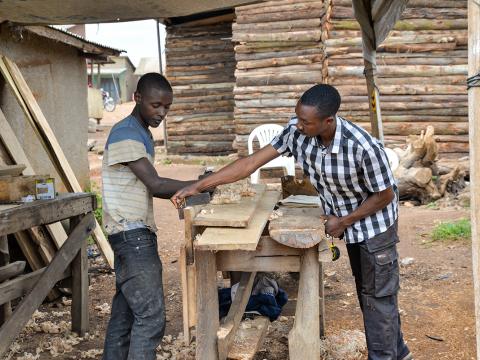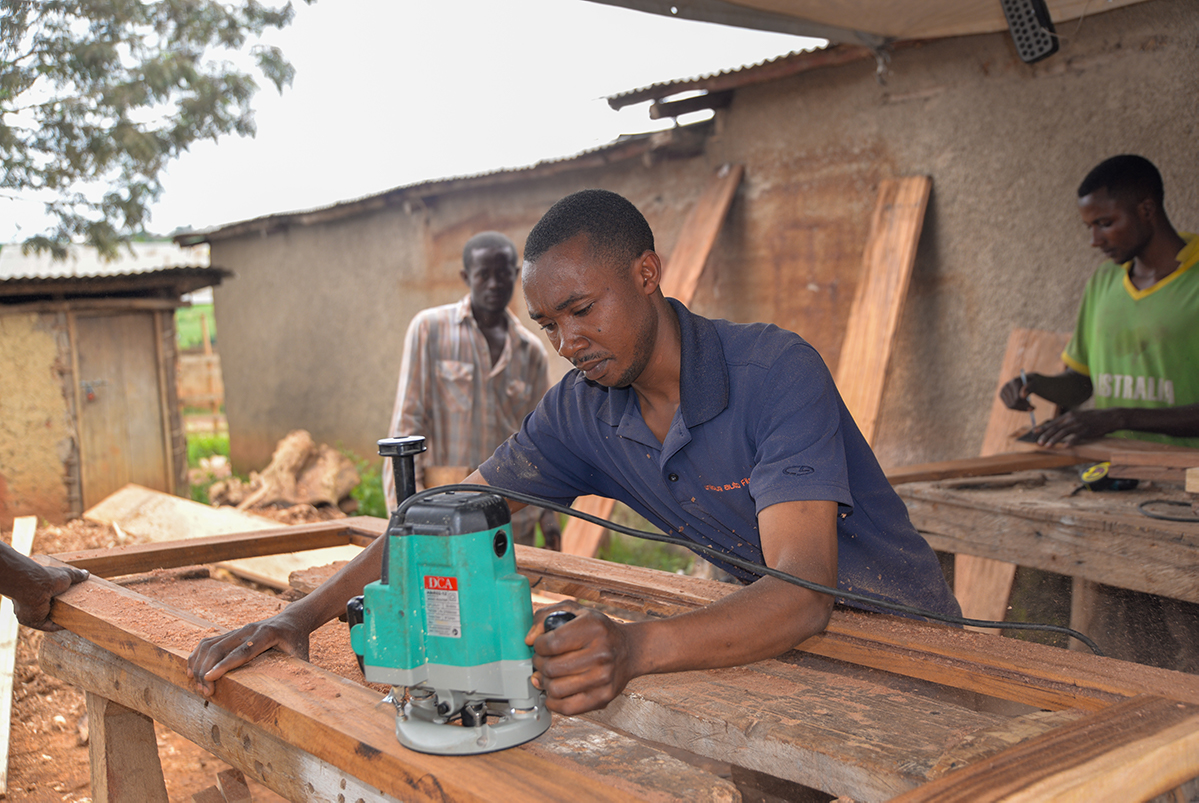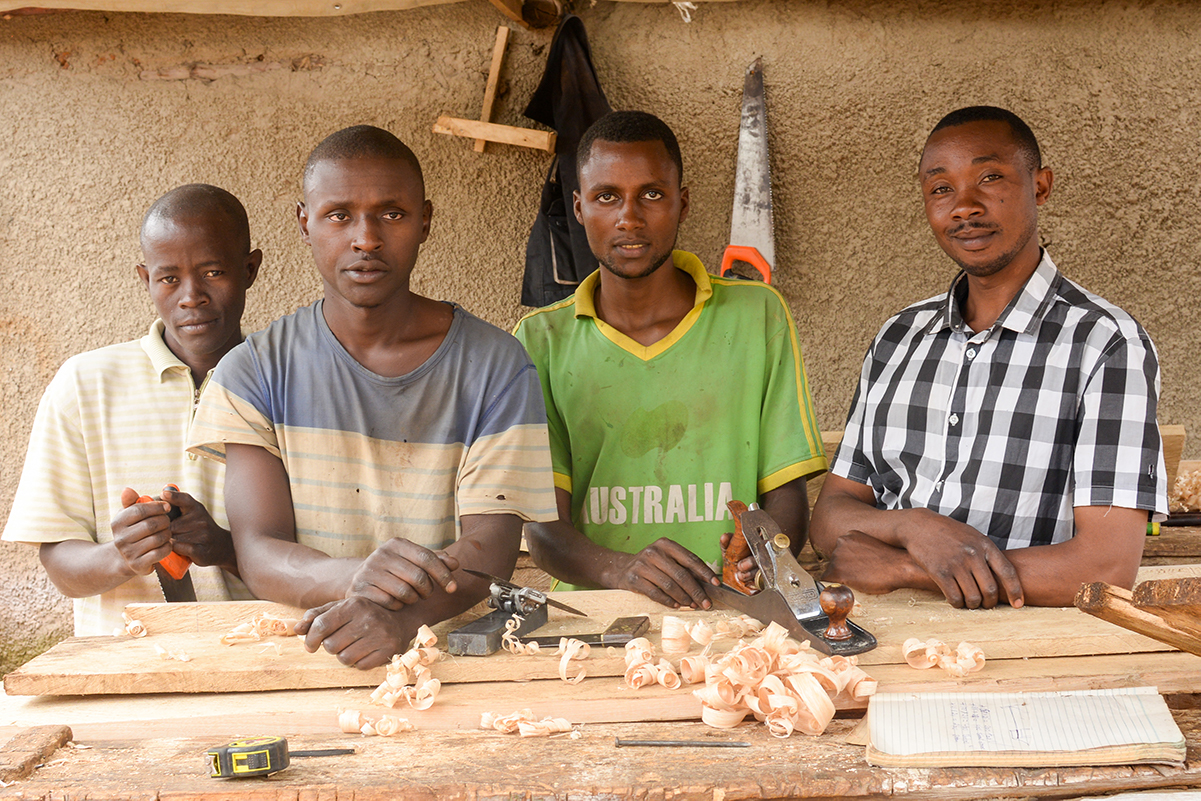The Incredible Story of Resilience Among Refugees -- How One Young Man Is Helping Others in Uganda

More than half of the 1.3 million refugees in Uganda are youth who were forced to flee their home countries as a result of war and lack of safety. Some left school, jobs and families. Bahati Shaban, 34, a refugee from the Democratic Republic of Congo is one of many who had to leave behind a good life and flee to Uganda. He arrived in the country in 2013 with his mother and siblings after his father and younger brother were both killed in Congo.
“The journey to Uganda was very challenging because we didn’t come with anything. We just found ourselves in Kampala. At that time we had no idea that there were refugee settlements in Uganda. We stayed in Kampala for more than two months before OPM [Office of the Prime Minister] relocated us to Kyaka II refugee settlement,” Bahati explained.
After reaching the settlement in southwestern Uganda, Bahati and his family were allocated a small piece of land where they could stay and start a life. Although he was grateful for, he says the land they were given was not enough to grow food and accommodate the members of his large family. They tried farming but despite their hard work, it never paid off because the land was too small. It’s then that Bahati started thinking about how important it was for him to move out of his comfort zone.
“When we arrived, many refugees had started constructing their small houses and it was an opportunity for me to start working. I moved around looking for some jobs to work as a porter and help those who were building. I got a number of opportunities and started earning something small for my family,” he says.
This however, wasn’t going to last forever. After a few months, demand for his services dropped as the number of refugees constructing houses declined and many other young men were competing for the same jobs. This is when Bahati realized that it was time to move on to something else. Something better and more permanent, something he loved, something he had learned and something that would make him his own boss -- carpentry.
Bahati’s father had been a carpenter and he taught his sone most of the basics in this trade. Bahati used the money he earned from working as a porter to start his new business. Once he got started, there was no looking back.
“I had managed to raise about Ushs 60,000 ($16 USD) from construction projects, so I bought my first hand-plane, tape-measure and hammer and started hunting for carpentry jobs,” he said.

‘Bahati’ is Swahili for luck and just like his name, Bahati was lucky to immediately get a customer who contracted him to work on his doors and windows for a small fee. He didn’t mind the fee because he was sure it was going to be a great opportunity for him to start. Having worked on this client’s items, he started attracting other clients.
“I had started to establish myself now. The only challenge was that I had no place to work. I couldn’t continue doing my business at this client’s place. After talking to him and explaining my situation and how much I needed to work, he let me keep the place for some time before we started paying him some rent. [Then], I got a few more youths to work with and the business started growing.” Bahati recalls.
One day, Bahati was sighted by a prominent carpenter and businessman who was visiting the settlement. The businessman offered him a contract to work with him in Kisasi, a Kampala suburb. This is how Bahati got back to Kampala and was forced to learn how to speak Luganda (which is commonly spoken by most Ugandans) to be able to effectively communicate with clients.
After a two-year stay in Kampala, Bahati returned to the settlement with the goal of developing fellow youth by creating employment opportunities for them and equipping them with skills. From his earnings in Kampala, he bought better tools and raised enough to pay rent. He named his workshop Vijana Twendereye (Youth Development) with a sole goal of redeeming his fellow youth out of poverty and unemployment.
“After this, I was sighted by World Vision who surveyed my business and found the place fit to train more youth. I was given some money to buy a few more items and this is how I got more trainees on board. I was supposed to train them for only four months but from my experience, this wasn’t enough time so I offered to train them for as long as they still wanted to learn,” he says.
David Muhindo and Jean Havashimana were among the students Bahati trained with support from World Vision. To Date, David continues to work with Bahati in his shop. Jean, on the other hand, went on to start his own business, using the knowledge and skills he had acquired.

“I didn’t know anything other than farming," explains Davie. "I was then enrolled by World Vision into this programme which has greatly improved my life. I can now join timber and wood to make beds, chairs and tables for people. With this work, I am able to afford to buy some soap for my family,” he explains.
David also praises his teacher (cum boss) for his persistence and patience when dealing with his students or employees. “Sometimes I fail to learn something the first time and maybe not even the second or third, but Bahati never gives up. He is always willing to continue teaching, always focusing on the positive side, with the hope that one time we will all learn and be like him, or even better than him. This has only encouraged me to work harder,” David added.
Ending youth Unemployment and Transforming lives
Bahati’s vision is to see all youth in the settlement and in Uganda wake up and do something on their own without waiting for the government to give them jobs. He believes there are many opportunities that the youth could grab to grow and develop themselves.
“The challenge with the youth in Uganda is that they wait for jobs to find them, forgetting that it’s all about proactiveness. They are lucky that it’s peaceful here, no bullets or bombs like the case in Congo and this is the most conducive environment for youth to work,” he said, “If I was to wait for jobs, I would still be on the streets now like many other youths, using drugs and drinking myself silly. And then I wouldn’t have been able to change the lives of all the people that I have been able to train and employ so far,” he added.
He recalls a youth, Phinesi Maombi, who was addicted to drinking and using drugs but is now a totally changed young man doing his work and earning some money at the workshop. Phinesi, 20, confirmed to us how meeting Bahati greatly transformed his life.
“I came with my mother and little siblings. After failing to find what to do, I resorted to drinking and taking drugs. This was my kind of life until the night I was so drunk and staggered into a restaurant looking for something to eat. I didn’t realize that I was stealing food. I was beaten up so badly and it was Bahati who rescued me. He locked me in his workshop store that night and the next morning we started working. I didn’t know anything, but he taught me. He became my friend since then and I am a changed person now, all thanks to him,” Phinesi confessed.
Saving and Loan association
Bahati didn’t stop at that, he introduced a savings association among the boys at the workshop to encourage them to save the little they are able to earn from their works. They meet every week after splitting their weekly earnings. Each one of them is required to save Ush 20,000 ($5 USD) every week with the association.
“I noticed that whenever the boys get money, they end up using the whole of it on unimportant things because sometimes it’s little. We therefore decided to come up with a mandatory saving culture which has greatly helped. They can now save enough to do bigger things at their homes and in their lives.” Bahati said. The association also provides small loans to other youths to attract a profit from interests.
‘Vijana Twendereye’ Workshop is located in Bukere trading Centre in Kyaka II refugee settlement. According to Bahati, the business has over 20 dedicated customers and his plan is to grow it even more through the expansion of staff, manpower and the kind of machines and tools used.
Uganda’s internationally-acclaimed refugee policy allows refugees, like Bahati, to startup businesses whenever and wherever they want. Charity Organizations like World Vision are trying to leverage this opportunity by empowering refugee youths to startup their own business through vocational training opportunities like the ones provided by Bahati. In Kyaka II alone, in partnership with the World Food Programme, World Vision has helped train more than 100 youth in carpentry, motor vehicle repairing, welding, hairdressing, and tailoring skills.